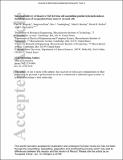Sustained delivery of bioactive TGF-β1 from self-assembling peptide hydrogels induces chondrogenesis of encapsulated bone marrow stromal cells
Author(s)
Kopesky, Paul Wayne; Byun, Sangwon; Vanderploeg, Eric J.; Kisiday, John D.; Frisbie, David D.; Grodzinsky, Alan J.; ... Show more Show less
DownloadPaul-JBMR-accepted 2013.pdf (1.099Mb)
OPEN_ACCESS_POLICY
Open Access Policy
Creative Commons Attribution-Noncommercial-Share Alike
Terms of use
Metadata
Show full item recordAbstract
Tissue engineering strategies for cartilage defect repair require technology for local targeted delivery of chondrogenic and anti-inflammatory factors. The objective of this study was to determine the release kinetics of transforming growth factor β1 (TGF-β1) from self-assembling peptide hydrogels, a candidate scaffold for cell transplant therapies, and stimulate chondrogenesis of encapsulated young equine bone marrow stromal cells (BMSCs). Although both peptide and agarose hydrogels retained TGF-β1, fivefold higher retention was found in peptide. Excess unlabeled TGF-β1 minimally displaced retained radiolabeled TGF-β1, demonstrating biologically relevant loading capacity for peptide hydrogels. The initial release from acellular peptide hydrogels was nearly threefold lower than agarose hydrogels, at 18% of loaded TGF-β1 through 3 days as compared to 48% for agarose. At day 21, cumulative release of TGF-β1 was 32–44% from acellular peptide hydrogels, but was 62% from peptide hydrogels with encapsulated BMSCs, likely due to cell-mediated TGF-β1 degradation and release of small labeled species. TGF-β1 loaded peptide hydrogels stimulated chondrogenesis of young equine BMSCs, a relevant preclinical model for treating injuries in young human cohorts. Self-assembling peptide hydrogels can be used to deliver chondrogenic factors to encapsulated cells making them a promising technology for in vivo, cell-based regenerative medicine.
Date issued
2013-05Department
Massachusetts Institute of Technology. Center for Biomedical Engineering; Massachusetts Institute of Technology. Department of Biological Engineering; Massachusetts Institute of Technology. Department of Electrical Engineering and Computer ScienceJournal
Journal of Biomedical Materials Research Part A
Publisher
John Wiley & Sons, Inc.
Citation
Kopesky, Paul W., Sangwon Byun, Eric J. Vanderploeg, John D. Kisiday, David D. Frisbie, and Alan J. Grodzinsky. “Sustained delivery of bioactive TGF-β1 from self-assembling peptide hydrogels induces chondrogenesis of encapsulated bone marrow stromal cells.” Journal of Biomedical Materials Research Part A (May 4, 2013): 1-11.
Version: Author's final manuscript
ISSN
15493296